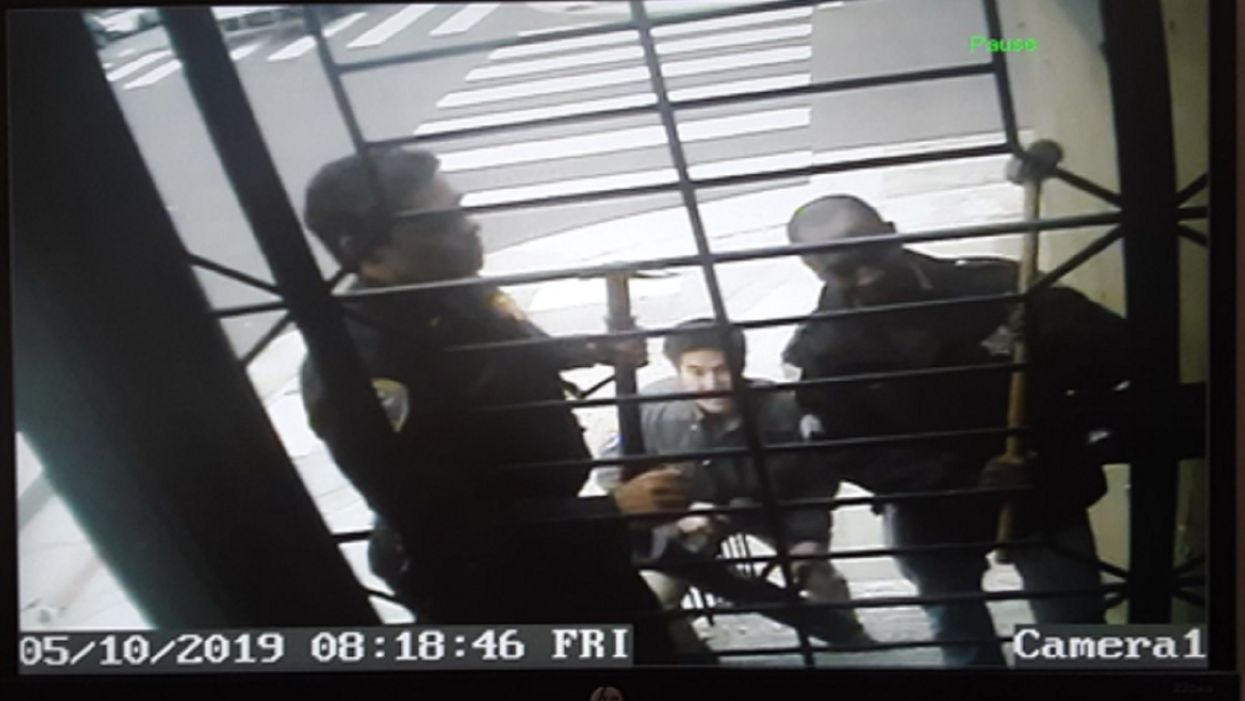
Image source: Bryan C. Carmody surveillance screenshot

'It's essentially the confiscation of a newsroom'
San Francisco police raided the home of freelance journalist Bryan Carmody on Friday morning, two weeks after he refused to betray the source of a leaked report exposing salacious details regarding the recent death of the city's longtime public defender.
Officers arrived with a sledgehammer and other equipment to break through the reporter's front gate, before he allowed them inside where they kept him handcuffed for several hours, searched his home and office with guns drawn, had him questioned by the FBI, and confiscated several items — including a copy of the report in question.
The San Francisco Police Department has been under pressure to find out who among them leaked the true cause of the February death of Public Defender Jeff Adachi, who, according to the San Francisco Examiner, "dedicated his career to uncovering police misconduct."
The Examiner said Adachi's friends and supporters believe the leak was "political retribution."
According to the Los Angeles Times, "initial reports said the 59-year-old public defender had been traveling when he suddenly had a heart attack." But soon, conflicting details began to leach out, and Carmody got his hands on the incident report.
The report revealed that on the night of Adachi's death, police responded to a 911 call from a woman — who was not Adachi's wife — saying the public defender was unresponsive. Officers arrived at an apartment where the two had reportedly planned to spend the weekend, and police photos showed "empty bottles of alcohol, cannabis gummies, and two syringes that may have been left by paramedics," KGC-TV reported.
The medical examiner found cocaine and alcohol in Adachi's system, and concluded the stimulants caused "cardiac stress" on "his already compromised heart," ultimately resulting in his death, KNTV-TV reported.
Adachi's widow made a public statement condemning the leaking of the police report, saying, "It was despicable what the police did to myself and my daughter. ... We had no privacy. It was an ongoing investigation and I don't believe that they should have released it."
The Public Defender's Investigative Unit also slammed the police for the leak, hinting at the possibility of it being a retaliatory act and blaming the media for exposing the details.
"The report was released prematurely at best, and far more concerning was sold to the media," spokesman Hadi Razzaq said at a public hearing in April. "And something the public should be aware of is that the police report was in the hands of media within hours of Mr. Adachi's death in a situation where the police themselves viewed the location as a possible crime scene and ongoing investigation.
"The fact that this happened involving the elected public defender who had a history of battling the police, exposing misconduct, is all the more troubling," he added.
Razzaq revealed that a freelance reporter allegedly sold the information to media outlets. Within days, police questioned Carmody about where he received the leaked report, but he refused to reveal his source. Two weeks later, officers showed up with a warrant to find the report, which was described as "stolen or embezzled" property.
While Carmody sat handcuffed, police called in and obtained a second warrant. Ultimately, Carmody told NBC News, "They took every electronic device that I own — every computer, every hard drive, every digital photograph that I have taken in the last 25 years."
They also took the leaked report, which they found in Carmody's safe. But the reporter said he doesn't believe they'll be able to find the source from the document.
Carmody told NBC he's always had a good working relationship with the SFPD, but now he just wants his equipment back.
"At this point, they've shut down my business completely," he said. "I don't have the gear I need to do my job."
The SFPD defended the raid, calling it "one step in the process of investigating a potential case of obstruction of justice along with the illegal distribution of a confidential police report."
Meanwhile, the local chapter of the Society of Professional Journalists is asking why the department ignored California's shield laws, which protect reporters from being forced to reveal their sources. The organization said the raid "shows an alarming disregard for the right to gather and report on information."
Carmody's lawyer, Thomas Burke, slammed the SFPD for its invasion of his client's work as a professional journalist, telling The Times, "It's designed to intimidate. It's essentially the confiscation of a newsroom."